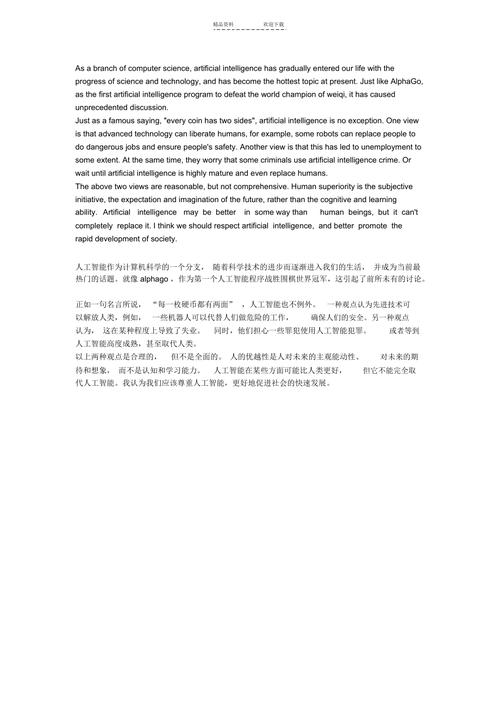与科技相关的英语作文
Title: The Impact of Technology on Modern Society
Technology has become an indispensable aspect of modern society, revolutionizing the way we live, work, and communicate. This essay explores the multifaceted influence of technology on various facets of contemporary life.
1. Enhancing Communication:
Technology has transformed the way people communicate, bridging geographical gaps and facilitating instant connections. Platforms such as social media, email, and messaging apps enable individuals to interact globally in realtime. However, concerns regarding privacy, misinformation, and cyberbullying have emerged, necessitating responsible usage.
2. Revolutionizing Industry:
In the industrial sector, technology has automated processes, increasing efficiency and productivity. Robotics and artificial intelligence (AI) streamline manufacturing, while data analytics optimize supply chains. Nevertheless, this automation raises questions about job displacement and the need for reskilling the workforce.
3. Advancing Healthcare:
The integration of technology in healthcare has led to significant advancements in diagnosis, treatment, and patient care. Medical imaging, telemedicine, and wearable devices facilitate remote monitoring and personalized healthcare delivery. However, accessibility issues persist, particularly in underserved regions and marginalized communities.
4. Empowering Education:
Technology has revolutionized education, offering innovative learning platforms and resources. Online courses, interactive simulations, and virtual classrooms transcend geographical barriers, enabling lifelong learning opportunities. Yet, the digital divide exacerbates educational inequalities, necessitating efforts to ensure equitable access to technology.
5. Transforming Entertainment:
The entertainment industry has undergone a digital revolution, with streaming services, virtual reality (VR), and augmented reality (AR) redefining content consumption. These immersive experiences provide unprecedented engagement but also raise concerns about addiction and the erosion of realworld interactions.
6. Shaping Economic Landscape:
Technology has reshaped the economic landscape, fostering entrepreneurship and driving economic growth. Ecommerce platforms democratize market access for small businesses, while fintech innovations revolutionize banking and finance. However, concerns about data privacy, cybersecurity, and digital monopolies warrant regulatory scrutiny.
7. Addressing Environmental Challenges:
Technology plays a pivotal role in addressing environmental challenges, offering sustainable solutions for energy, transportation, and resource management. Renewable energy technologies, smart grids, and electric vehicles mitigate carbon emissions and promote environmental sustainability. Yet, ewaste, digital energy consumption, and technological obsolescence pose new environmental concerns.

8. Cultivating Social Connectivity:
Technology facilitates social connectivity, fostering communities and collective action for social causes. Crowdfunding platforms, online activism, and social networks amplify voices and catalyze social change. Nonetheless, the prevalence of online echo chambers and algorithmic bias challenge the integrity of digital discourse.
In conclusion, the pervasive influence of technology on modern society is undeniable, with farreaching implications across various domains. While technological advancements offer unprecedented opportunities for progress and innovation, they also pose ethical, social, and environmental challenges that require vigilant consideration and collective action.
Word Count: 397
```html
The Impact of Technology on Modern Society
Technology has become an indispensable aspect of modern society, revolutionizing the way we live, work, and communicate. This essay explores the multifaceted influence of technology on various facets of contemporary life.
Technology has transformed the way people communicate, bridging geographical gaps and facilitating instant connections. Platforms such as social media, email, and messaging apps enable individuals to interact globally in realtime. However, concerns regarding privacy, misinformation, and cyberbullying have emerged, necessitating responsible usage.
In the industrial sector, technology has automated processes, increasing efficiency and productivity. Robotics and artificial intelligence (AI) streamline manufacturing, while data analytics optimize supply chains. Nevertheless, this automation raises questions about job displacement and the need for reskilling the workforce.
The integration of technology in healthcare has led to significant advancements in diagnosis, treatment, and patient care. Medical imaging, telemedicine, and wearable devices facilitate remote monitoring and personalized healthcare delivery. However, accessibility issues persist, particularly in underserved regions and marginalized communities.
Technology has revolutionized education, offering innovative learning platforms and resources. Online courses, interactive simulations, and virtual classrooms transcend geographical barriers, enabling lifelong learning opportunities. Yet, the digital divide exacerbates educational inequalities, necessitating efforts to ensure equitable access to technology.
The entertainment industry has undergone a digital revolution, with streaming services, virtual reality (VR), and augmented reality (AR) redefining content consumption. These immersive experiences provide unprecedented engagement but also raise concerns about addiction and the erosion of realworld interactions.
Technology has reshaped the economic landscape, fostering entrepreneurship and driving economic growth. Ecommerce platforms democratize market access for small businesses, while fintech innovations revolutionize banking and finance. However, concerns about data privacy, cybersecurity, and digital monopolies warrant regulatory scrutiny.
Technology plays a pivotal role in addressing environmental challenges, offering sustainable solutions for energy, transportation, and resource management. Renewable energy technologies, smart grids, and electric vehicles mitigate carbon emissions and promote environmental sustainability. Yet, ewaste, digital energy consumption, and technological obsolescence pose new environmental concerns.
Technology facilitates social connectivity, fostering communities and collective action for social causes. Crowdfunding platforms, online activism, and social networks amplify voices and catalyze social change. Nonetheless, the prevalence of online echo chambers and algorithmic bias challenge the integrity of digital discourse.
In conclusion, the pervasive influence of technology on modern society is undeniable, with farreaching implications across various domains. While technological advancements offer unprecedented opportunities for progress and innovation, they also pose ethical, social, and environmental challenges that require vigilant consideration and collective action.
